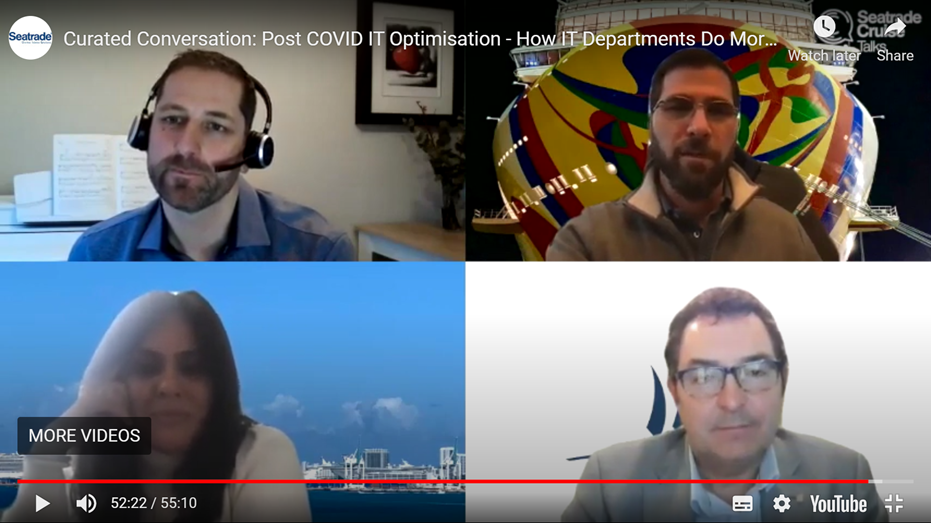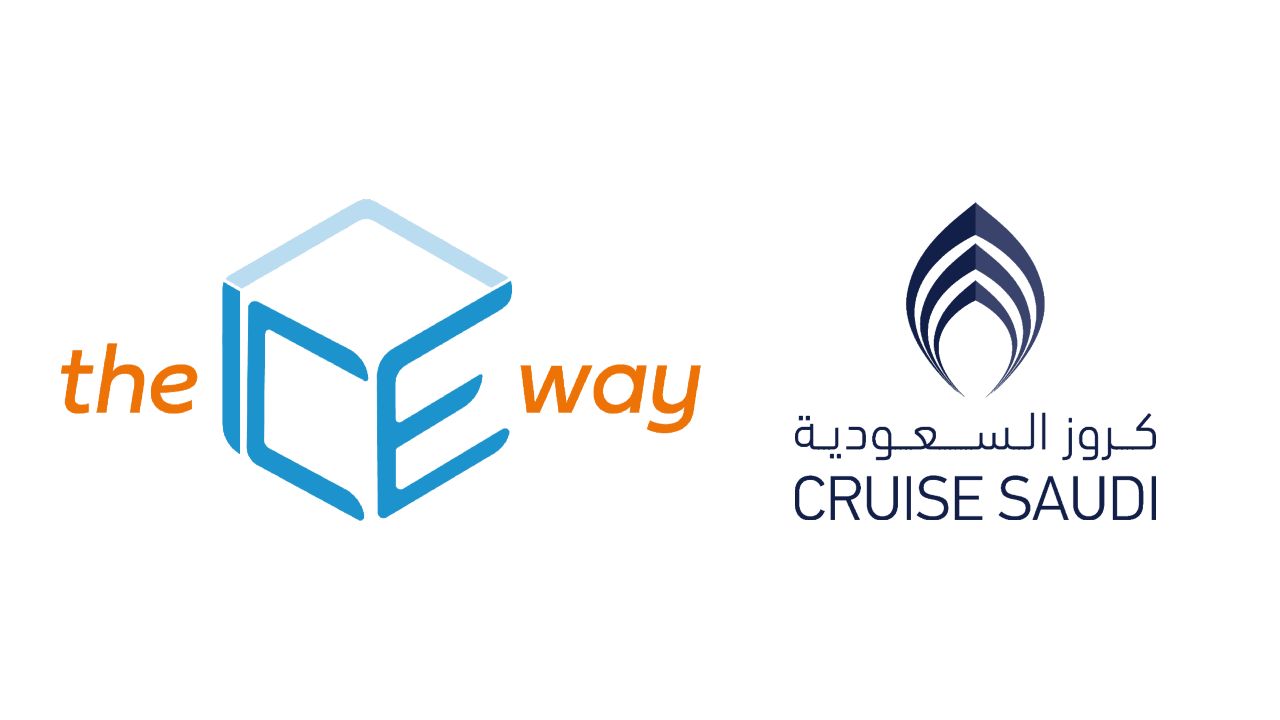This week we will cover the final segment of the ‘Post-COVID IT optimisation: How IT departments can do more with less’ STC Talks discussion. In previous weeks we have heard about what the IT teams at NCLH and Ponant did in the immediate aftermath of the pandemic and beyond. Today we’ll hear about some of the longer-term implications those actions have had.
Watch the video here.
Seatrade Cruise Talks: Post-COVID IT optimisation
Moderator:
Ian Richardson (IR), CEO and Co-Founder of theICEway ecosystem of companies & Seatrade Global Technology Ambassador.
Panellists:
Jean-Louis Cambert (JLC), Chief Operation Officer for Ponant
Dimple Jethani (DJ), CIO & SVP IT Operations & Governance for Norwegian Cruise Line Holdings (NCLH)
Scott Piccolo (SP), CIO & SVP Enterprise Applications & Emerging Technology for NCLH
Transcript:
IR: “I wanted to come on to managing costs and we've talked a little bit about it but how have you managed to keep innovating while keeping the cost down over the last year? How do you remain innovative? Scott, you touched on it in terms of it's difficult when you're remote because those coffee machine conversations don't necessarily happen. It's difficult when everybody's on zoom so have you any thoughts on how you can keep innovating within the industry? For IT Operations?”
SP: “Dimple and I always had ideas of where we wanted to go, what our plan was, our strategy, and that hasn't changed. Some things have obviously been put on pause during this time but it doesn't mean that internally we can't do some things to set some groundwork. We're still going to do the things we want to do, we might not just be able to do them right now, so for example that might be we are now pushing very hard to move all of our key initiatives to a more agile methodology, going to more of a product model, and what that's going to do is that's going to help us. It's a foundational piece that's going to help us with innovation in the future where we can then start to build applications that we can get into production in weeks, not months or years, that type of thing, so we have to do a lot of that work in order to get there.”
“The other thing is, when you're a lean organisation you have to look at every opportunity and say where's that value, it just becomes even more critical, more important, and I think that in a way helps because then it sort of shines a light on some of what we think are very innovative things that we want to do because you can quickly see the value to the organisation, quickly see the value to the company, whether that's a monetary value or it's an overall guest experience value, these are all things that are going to make a difference and I think you see it more when you're in this type of environment. I think it just naturally shines that light on these types of initiatives and it forces us as an organisation and again, this is outside of IT, it forces us to all come together and agree on what makes the most sense for this tri-branded enterprise organisation and that helps us because then we get consensus within the entire organisation instead of in a normal environment where you're kind of getting pulled in multiple directions where this is what's most important to this group, this part of the business, but something over here is just as important to this side of the business. Now I think we're in that situation where we're forced to all come together and say, ‘well we can only do one so let's agree what it's going to be and then let's do that and let's do it well’, and I know it's a very simplified explanation of it but I believe that hopefully that is one of the things that we are seeing because of this and I think again it helps us manage that demand. Managing our demand is so critical because if you are so busy with all the minutia, it's hard to focus on your strategy”.
IR: “And your team only has so much bandwidth”.
SP: “Exactly. So we don't lose sight of the goal, what's our strategy, what are the things we think are important, how do all these initiatives come together to provide one big value to the organisation. We haven't lost sight of that but there's things we can do that don't necessarily cost a lot of money and there are things we can do internally to continue to refine ourselves, things like cleaning up redundant systems, getting rid of some technical debt, all these things we can do and actually save the organisation money while at the same time setting up a foundation for what we know we want to do in the future so there's plenty for us to do, it doesn't necessarily have to cost a lot and it's all innovation. It's all part of that process of truly innovating.”
“The idea of innovation with purpose, what are we trying, why are we doing it, what are we trying to accomplish, and I think this just puts a bigger spotlight on the why are we trying to do it, what's the purpose, what's the value, so I think it's something that we can continue to do and it helps us.”
IR: “In the final bit of this session I want to look to the future a little bit and discuss how we see the next year or two panning out. What do we think it will take to see cruise lines restarting safely? Dimple, you mentioned vaccinations but would you think we'll see the introduction of mandatory vaccination certificates?”
DJ: “I think it’s a possibility, I really do. I think it mitigates a tremendous amount of risk. I think it'll make other guests feel comfortable, not saying we're definitely going to do that but I think it's a strong consideration. I would imagine a lot of the agencies regulating this will give them more confidence in our industry. I think we talked about the fact that no other industry is under the same level of scrutiny as ours, everyone else has been allowed to operate. I just saw the CDC is now mandating international passengers to be pre-tested and then be tested upon arrival when they return home, that's the first we've seen in the airline industry. There's been no regulation requirement in that industry, so I do think vaccinations are at the crux of this. We're all looking at world health passports or vaccination records and linking your results, whether it's your pre-test results to your identity and technologies around that, I think that's pivotal to returning safe because it is difficult. We look at all the changes, this virus has changed how many times? We thought the summer is getting better, then this is going to get better, then we had another set of variants so I think you look at the epidemiologists and all the medical community, they don't even know, so if I look at it from that perspective, vaccinations I think are critical to our return sailing program”.
SP: “It'll be a critical component of it, unfortunately it won't mean the rest of this technology necessarily goes away immediately”.
IR: “No, not at all, it's going to be around for a while even with the vaccines I think. So now we come to the big question which a lot of people listening in or watching will be interested in; we've talked a lot about IT spending and what and how the focus is going to be on cost saving, do you think the spending budgets will return? And if so, when? Are we talking never, or maybe in 5 years or a couple of years?”
JLC: “I think that everybody seems to agree that next year will be difficult and perhaps in 2023 we could find our revenue and our margin like before, and the number of passengers that we had that we planned to have in 2020. So I think that we have 2 difficult years at least but we hope for 2023”.
SP: “I think I would agree with that. I don't think that that means we just sit on our hands and status quo, I can tell you our leadership are very progressive in terms of understanding that we can't do that and that we've got to find a way to keep moving forward so this just ties back to the conversations we've been having. We just have to be a lot more efficient and we just have to make decisions on what we all agree is most important and that's where we'll fund those initiatives, so the budget won't be what it was and it won't be for at least two years. I agree with Jean, but it doesn't mean that we won't get budget for what we think are critical innovative initiatives that we feel will bring value to the company”.
IR: “So what you are saying is that things are going to be more scrutinised for the next couple of years?”
SP: “Yes, which isn't necessarily a bad thing for us. I know that sounds strange but again, when you look at it from a demand-management perspective and the ability to really focus the business and the IT teams on an initiative, it's actually a value, a plus from that perspective, so have to look at it like that as well but we still have to keep the lights on, that doesn't go away. You have to do it, you have to stay compliant, keep your systems up to date, you’ve got to do all that and it costs money so there'll be budget there but in terms of really innovative initiatives, I think it'll just be more scrutinised and we will as an organisation have to all agree on what's most critical to the organisation and then those are the things that will continue to get funded”.
DJ: “I think that focus will accelerate delivery of those things, when you're focused on the 3 or 4 most important things, you get more done. Everyone is not running in 10 different directions – you don't finish projects then”.
IR: “Trying to do too many things at once; any thoughts on that, Jean-Louis?”
JLC: “Oh I think that budget is really big, it's really necessary when you want to change for example your booking system, your finance system, but all of this can be postponed but for the quick win for the mobile apps, or very high level or high value development, it can be made without a lot of money – so just energy and skills”.
IR: “One final question then to you all, I'll start with Jean-Louis; what would you say has been the biggest lesson that you've learned as a result of this pandemic?”
JLC: “That we absolutely need flexibility, nobody knows what happens in the next years so we really must think about how to change quickly. Think flexible and reactive, this is really very important I think”.
IR: “Scott?”
SP: “I would agree with that, I think it just demonstrated how important it was or is for us to have systems that are flexible, that allow us to deal with the unknown and we all hope this is it, this is the last time we had we experienced something like this but you know nothing is certain so we need to make sure that we take the lessons that we learned from this event and continue to expand on that and get better at really creating that redundancy and that flexibility and everything that we needed in order to pivot as quickly as we did when this happened. So I think that that was a very important lesson learned and the people again, you can't stress enough how important the people are to this. Everybody focuses on the technology but at the end of the day, with something like this you really have to have a good culture within your organisation and you really have to focus on the people in making sure that you know they feel like they're a part of something even when everybody's been dispersed in the world because we don't know when we're all going to be in an office again or if we're all going to be in office again. I think that was a very important lesson that we've been learning in terms of how we manage that with our folks”.
IR: “And finally, final words to Dimple; what lessons have you learned?”
DJ: “I don't have any final words! I think coming from a consulting background both Scott and I being flexible and adapting is in part of our DNA. The lesson for the entire team is I think I look at our organisation, they've learned the value of that and they learned how much they can achieve as a part of that, so I think there's been that piece and something I've said to Scott for I think 20 plus years to some degree, but more so in the last 10 months, is a lot of good can come from bad things and taking advantage of that opportunity is critical, and that I think allows the organisation to constantly drive towards something and I think that's helped the morale so you can't just go ‘all is lost’; you pick up, you look at what you can do now, where do we move forward, and I think that's the lesson of every day. How do I make something out of nothing, to some degree?”
SP: “And making sure people understand that they are contributing to something very important, that they're more than just a ‘cog in the machine’”.
IR: “Well thanks everyone, thank all three of you for all your insights, it's been a really good discussion so I hope everybody who's been watching has got a lot of insight from it, so thanks very much”.
SP: “Ian, thank you, we appreciate it”.
So that is the end of our trilogy. Frodo may not have thrown a ring into a volcano. Batman might not have sacrificed himself to save the citizens of Gotham. Hopefully though, you have gleaned a lot more from our latest collaboration with Seatrade Cruise. Until the next time…
If you would like a copy of the transcript in full, leave a comment below; we welcome all feedback, and will endeavour to respond to all responses. Look out for updates on the upcoming Seatrade Cruise Virtual Tech & Innovation event in April. Ian Richardson, our Co-Founder and CEO, is the Seatrade Cruise Technical Ambassador and will be featuring prominently in what we think will be another fantastic experience!










Leave a Comment